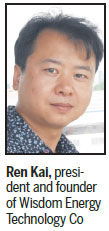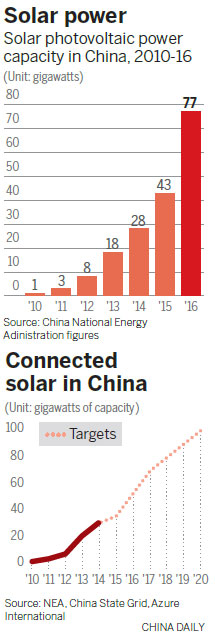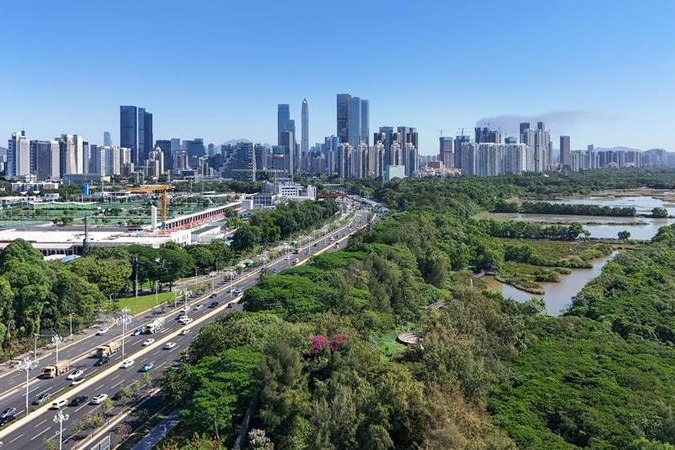Rooftop power challenges being tackled

Subsidies and 'solar leasing' among the steps taken to encourage use of systems in homes, buildings
Are you interested in an investment that can yield a return higher than a compounded rate of 12 percent per year and also help the environment? Ren Kai, president and founder of Wisdom Energy Technology Co, says that a typical roof solar panel installed on a house or building in Beijing pays back the cost of installation within six years. After that, for the estimated 25-year life of a system, the electricity generated is free.
As part of the strategy to move toward a broader energy mix, the government provides subsidies for power generated by solar power systems plus a guaranteed rate for selling power back to the grid. This is in addition to the savings from generating your own power.
In Beijing, the current price of electricity is about 0.5 yuan/kWh. For every kilowatt-hour of electricity generated, a household with a solar roof gets a subsidy of 0.42 yuan from the central government and 0.30 yuan from the city, according to Ren. On a commercial building, the payback can be even higher, adding up to about 1.70 yuan/kWh. The subsidy rates are different in other regions of China.

So far, battery storage has been uneconomic in most solar power systems, so any electricity not used by the building is sold back to the grid at the rate of 0.35 yuan/kWh.
However, despite favorable subsidies and relatively good sunlight, Beijing lags behind places such as Zhejiang and Jiangsu provinces in installed rooftop solar, notes Anders Hove, a power policy consultant at the Paulson Institute. "Consumers' difficulty in connecting to the system is a major barrier to distributed solar in Beijing, as is low market awareness. Beijing could consider raising targets by neighborhood based on roof area, and requiring State-owned companies and government buildings with large rooftops to install distributed solar," he said.
"To reduce complexity of interaction, many US utilities have online platforms where installers and property owners can complete all application steps, submit documents, track interconnection progress, find approved installers and even contact online help desks to ask questions, just like anyone buying products on Taobao."
In 2012, Ren installed a 3-kilowatt solar system on his home. The first in Beijing, it is still generating power. After working at Sony-Ericsson and Applied Materials, a US-based engineering company specializing in semiconductors and solar panels, he used 500,000 yuan ($74,000; 64,000 euros; £57,000) of his savings to start Wisdom Energy in 2013.

The company helps clients choose and install the right rooftop solar systems for their needs.
Like almost all startups, the first years were challenging. He has had 30 clients, but the business is maturing and Ren expects to be profitable this year.
Wang Yifan, a PhD candidate at the Chinese Academy of Sciences, hired Wisdom Energy to install solar panels on his family home in Shunyi in August 2016. For a cost of 200,000 yuan he installed a very large 18-kilowatt set of panels.
"The panels roughly cover our electricity usage during the day, though I have not seen a monetary payback on the investment yet," He says. In the 11 months since they were installed, his solar panels have produced 20,000 kWh of electricity, he says. Since this was more than the house could use at the time, 15,000 kWh of that power was sold back to the grid.
The biggest problem limiting the further spread of rooftop solar panels in Beijing is the difficulty of arranging financing. Despite the high rate of return on the investment, many home or building owners are reluctant to make a substantial upfront investment. Ren says that even the high payback from solar installations is not enough to lure customers, who are used to the very high recent returns from buying apartments.
So, Wisdom Energy is starting to work with large financial companies who would use a model, pioneered by SolarCity Corp, a subsidiary of Tesla in the US, called "solar leasing". The leasing company pays to install the solar power system and then sells the power back to the homeowner at a contracted rate. The homeowner does not have to pay the upfront costs, but, of course, loses some of the cost-savings of the system. In exchange, the finance company is able to achieve a high and stable return on its investment. Solar panel producers and installers like this financing means because it expands the demand for their products.
In a March Paulson Institute article, Hove argues that the 13th Five-Year Plan (2016-20) wisely pushed the growth of rooftop solar. Though such "distributed" solar now accounts for less than 10 percent of China's total installed solar capacity, it does not require extensive changes in the electrical grid to get it to consumers. He writes: "Distributed solar is more efficient in the long run because its power can reach customers without expensive transmission or changes to national or regional power system operations."
Contact the writers at davidblair@chinadaily.com.cn and yandongjie@chinadaily.com.cn
(China Daily Africa Weekly 07/21/2017 page8)
Today's Top News
- Trump's 50% tariff threat on EU goods draws rebuke
- Xi sends congratulatory letter to 20th Western China International Fair
- China to boost high-quality development in national development zones
- Xi extends condolences over death of former Vietnamese president
- Ukraine crisis a lesson for the West
- Autonomous networks driving the progress of telecom sector






























